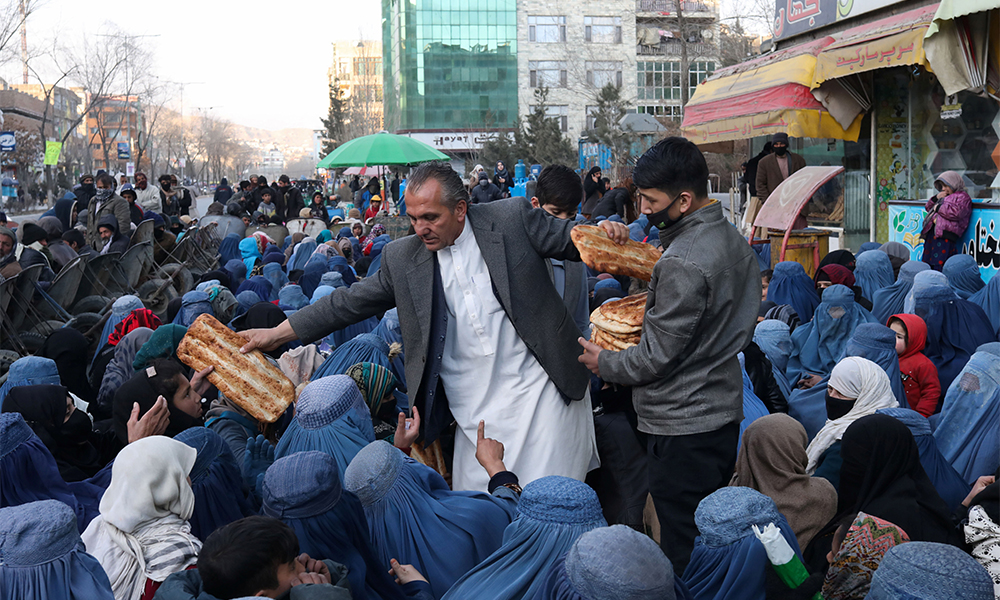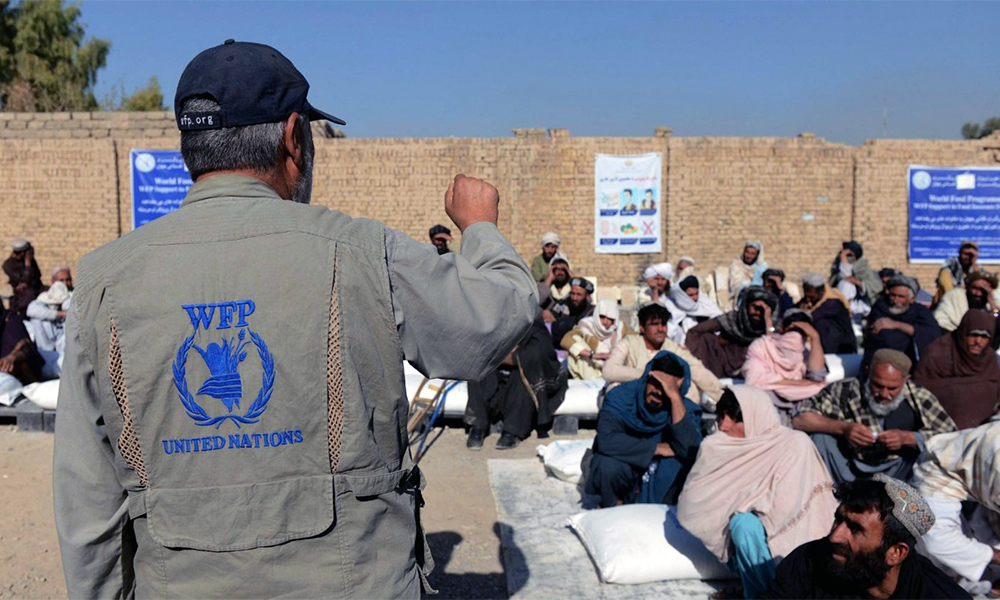Latest News
Hunger and poverty surge in Afghanistan as drought persists

The International Federation of Red Cross and Red Crescent Societies (IFRC) has called for increased global support to stem spiraling hunger in Afghanistan as one of the world’s worst humanitarian crises threatens millions.
As part of their ongoing support, the IFRC has appealed to the international community for 80 million Swiss francs ($82.5 million) to support the Afghan Red Crescent to deliver emergency relief, health services and recovery assistance to more than one million people in the provinces hit by multiple crises.
Amidst mounting poverty, 70 percent of households are unable to meet basic food and non-food needs, with particularly devastating effects for homes headed by widows, the elderly, people with disabilities, and children.
An estimated three million children are at risk of malnutrition and susceptible to diseases while thousands of people have resorted to begging in the streets.
Dr Mohammad Nabi Burhan, Secretary General of Afghan Red Crescent, said: “It is horrifying to see the extent of hunger and resurgence of poverty that we have fought so hard to eradicate.
“It is particularly worrying for Afghans in rural and remote areas, where some of the country’s poorest communities face widespread destitution and very high levels of malnutrition after their crops failed or livestock perished.
“A lack of food should not be a cause of death in Afghanistan. There needs to be a concerted international effort to continue critical humanitarian assistance across the country so that lives can be saved,” he said.
Afghan Red Crescent is ramping up its response operation using available funds, giving immediate priority being on food and cash distributions as well as providing health services via more than 140 health facilities across Afghanistan. However, the latest reports show much more assistance will be needed.
Necephor Mghendi, IFRC’s Head of Delegation for Afghanistan, said: “As well as providing critical relief to people struggling in the face of severe drought and hunger, livelihood interventions should be supported to enable people to restore means of earning an income.
“There is also a need for investment in local institutions that deliver vital services in the cities as well as remote areas. Locally staffed, well-functioning institutions are proven to help the most vulnerable, including children, women, and the elderly in every corner of Afghanistan.”
Latest News
Afghan delegation to participate in Iran’s international expo

Iranian officials have announced that a 200-member delegation, comprising Afghan government officials and private sector representatives, will attend the 7th International Exhibition of Iran’s Export Capabilities.
Officials from the Islamic Emirate, meanwhile, consider the presence of Afghan traders at this exhibition to be significant, stating that showcasing domestic products will help promote and market Afghan goods.
Abdul Latif Nazari, Deputy Minister of Economy, said: “Economic cooperation between the private and public sectors of Afghanistan and Iran is in the interest of both countries.”
“The visit of the high-ranking delegation of the Islamic Emirate to Iran can play a vital role in expanding economic and trade exchanges between the two countries,” he added.
In addition, Afghanistan Chamber of Commerce and Investment (ACCI) said that 80 booths have been allocated to Afghan traders at the exhibition, where agricultural products, precious stones, and other Afghan goods will be showcased.
Several experts also stated that Afghanistan’s participation in regional and international exhibitions is important and can lead to stronger economic ties with other countries.
This comes as Iran remains one of Afghanistan’s key economic partners, with annual trade volume between the two nations exceeding $3 billion.
Latest News
14 kms of TAPI pipeline laid inside Afghanistan, says project manager

Baganch Abdullayev, the General Director of the TAPI project in Afghanistan, on Thursday met with Noor Ahmad Islamjar, the governor of Herat, for a report back on progress made in accelerating the pipeline-laying process of the Turkmenistan-Afghanistan-Pakistan-India project in the province.
The Herat governor’s press office said in a statement that Abdullayev shared a brief report on the progress of the TAPI project with Islamjar.
According to the statement, Abdullayev said so far 14 kms of pipeline has been laid while an additional 24 kms of ground has been levelled for the pipeline.
During the meeting, the governor of Herat also welcomed the efforts of TAPI project officials in advancing the work and assured the project head of the local administration’s full support in facilitating the swift progress of the project.
Once completed, TAPI pipeline will transport natural gas from the Galkynysh Gas Field in Turkmenistan through Afghanistan into Pakistan and then to India.
The pipeline was completed on the Turkmenistan side in 2024, and the project is currently expanding southbound in Herat Province of Afghanistan.
Latest News
WFP appeals for $25 million to help support Afghan returnees amid humanitarian crisis

The World Food Programme (WFP) this week issued an urgent appeal for $25 million to address the escalating needs of Afghan refugees being expelled from Pakistan.
According to the WFP, thousands of Afghan families are crossing into Afghanistan from Pakistan every day and face serious food insecurity.
The organization also stated that millions in Afghanistan are grappling with severe hunger, and immediate aid of $25 million is needed to assist returnees.
On Wednesday, April 23, in a video shared on X, WFP’s head in Afghanistan, Mutinta Chimuka, visited the Torkham border crossing with Pakistan. During her visit, she highlighted the challenges faced by returnees, many of whom have spent their entire lives in Pakistan and are unfamiliar with Afghanistan.
Chimuka pointed out that many returnees have no income, employment, food, or shelter.
The WFP stressed that thousands of families are being forced to leave Pakistan, while 15 million people in Afghanistan are uncertain where their next meal will come from. The situation has become dire, with basic needs going unmet for a large portion of the population, the WFP said.
Chimuka warned that current aid efforts are insufficient to support the returnees, and new financial resources are urgently needed to address their needs by the end of the year.
Meanwhile, the pace of deportations and expulsions of Afghan migrants from neighboring countries, particularly Pakistan, continues to increase. The Pakistani Ministry of Interior reported that over 100,000 Afghan migrants have been returned since April 1.
The International Committee of the Red Cross (ICRC) has also raised alarm, noting that while thousands of refugees return every week, there are millions of Afghans who are currently facing poverty, homelessness, and difficult living conditions.
-

 World5 days ago
World5 days agoThousands of protesters rally against Trump across US
-

 Latest News5 days ago
Latest News5 days agoPolio vaccination campaign launched in Afghanistan
-

 International Sports3 days ago
International Sports3 days agoIPL 2025: Robo-Dog ‘Champak’ explained
-

 International Sports5 days ago
International Sports5 days agoIPL 2025: 14-year-old Vaibhav Suryavanshi becomes youngest IPL player
-

 Latest News3 days ago
Latest News3 days agoAriana Afghan Airlines increases flights to China
-

 World4 days ago
World4 days agoPentagon chief Hegseth shared sensitive Yemen war plans in second Signal chat, source says
-

 Latest News3 days ago
Latest News3 days agoChina invites various Afghan delegations to attend Shanghai forums
-

 Regional4 days ago
Regional4 days agoJD Vance arrives in India, to hold talks with Modi under US tariffs shadow
























